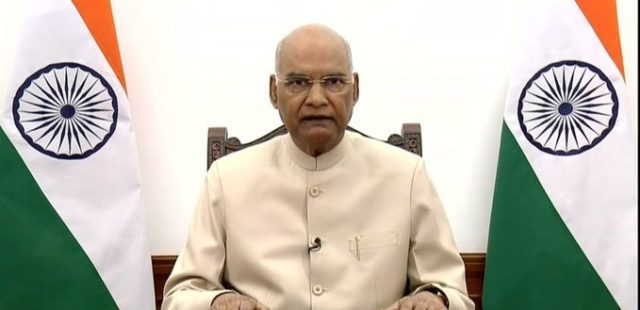New Delhi: Infrastructure is the foundation for development in any country. The government also views infrastructure as a bridge to address social inequality, said President Ram Nath Kovind while addressing the Parliament’s joint sitting on Monday.
“Investment in infrastructure not only generates lakhs of new jobs, but also has a qualitative impact, enhancing ease of doing business, facilitating faster transport and promoting economic activities across sectors”, the President said.
Speaking on the Pradhan Mantri Gatishakti National Master Plan to accelerate infrastructure development in the country, the President was hopeful that it will usher in a new era of multi-modal transport in India and the railways, highways and airways will no longer be separate and isolated infrastructures.
Kovind said that around 36,500 km of roads have been built in rural areas, at the rate of more than 100 km per day and thousands of habitations have been connected with all-weather roads. “As against 90,000 km of national highways in March 2014, today we have more than 1,40,000 km of national highways. Under the Bharatmala Project, construction of more than 20,000 km of highways is in progress with an outlay of about Rs 6 lakh crore, including 23 green expressways and green-field corridors”, said President. He also said that the Delhi-Mumbai Expressway is also nearing completion and will be the longest and fastest expressway in India.
Addressing the joint session, the President said that along with opening ways for development, the modern infrastructure is also providing new strength to country’s security. Border Roads Organization has constructed a transport-worthy road at 19,000 ft, the highest altitude for such a road, at Umling La Pass in Ladakh. Even the most remote villages like Demchok in Ladakh, Joling Kong in Uttarakhand and Huri in Arunachal Pradesh have been connected by modern roads, he added.
President also talked about new Vande Bharat trains and new vistadome coaches which have added new feathers to the Indian Railways. In the last seven years, 24,000 km of railway route has been electrified. Laying new railway tracks and double-laning are also progressing rapidly. Gandhinagar railway station in Gujarat and Rani Kamalapati railway station in Madhya Pradesh now provide new glimpse of modern India, he said.
Lauding the government’s efforts for its work in public transportation field, President informed the joint session that eleven new metro routes have been commenced, benefiting lakhs of people in 8 states every day. He said that India is now also among the four countries in the world having largest driverless train networks. We have also developed Indigenous Automatic Train System in the country which symbolizes the growing capability of Make in India.
“The government has also accorded approval for the construction of 21 greenfield airports in the country, among which is the country’s biggest airport coming up at Gautam Buddh Nagar district in Uttar Pradesh”, said President Kovind.
“More than 80 connectivity projects are also in progress under the Sagarmala program to connect the country’s important commercial hubs with ports. So far, 5 existing National Waterways and 106 new waterways in 24 States have been declared as National Waterways, taking the total number of National Waterways to 111. Out of these, 23 waterways are viable for transportation of cargo. With the objective to modernizing infrastructure, more than 27,000 circuit km of transmission lines have also been laid by the government”, President said in his joint session address.




 Ms Kalinga
Ms Kalinga